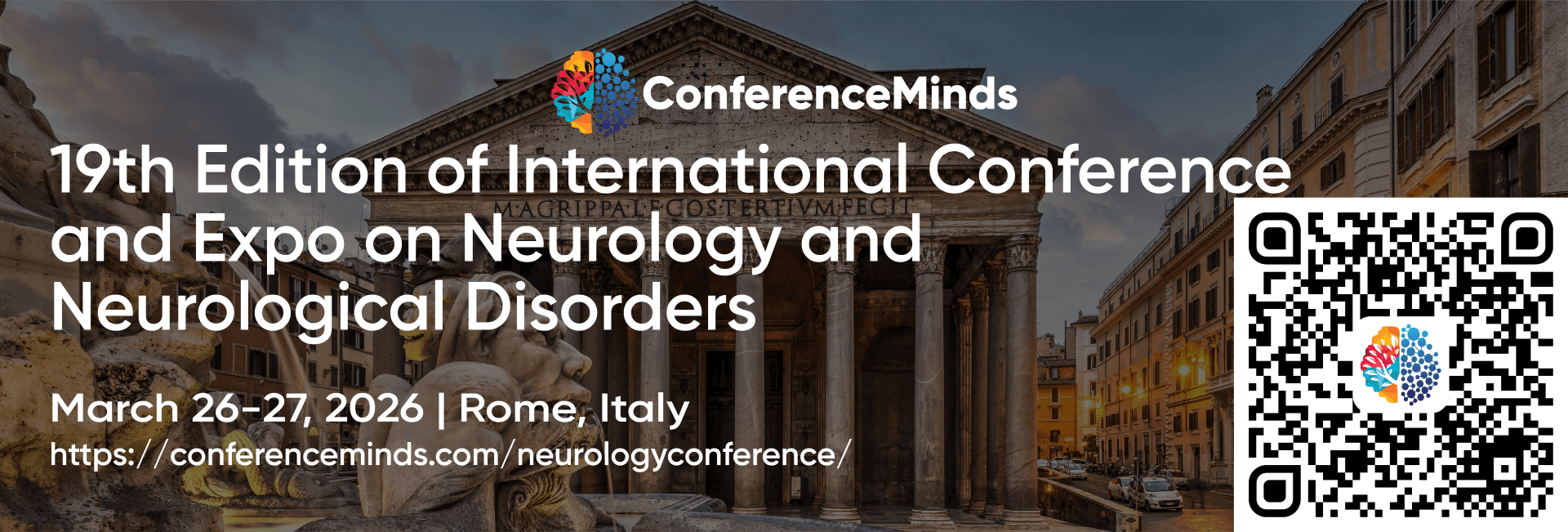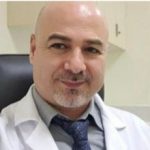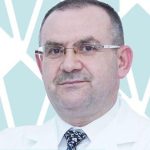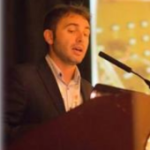Event Date
March 26-27, 2026
Venue
Rome, Italy
– Previous Conference Performers / Professionals From Around The Globe –
Media Partners/Collaborator
A huge thanks to all our amazing partners. We couldn’t have a conference without you!



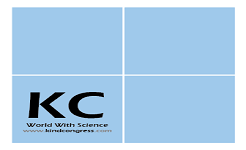






Sponsors/Exhibitors
A huge thanks to all our amazing partners. We couldn’t have a conference without you!


Neurology conference 2026
The 19th International Conference & Expo on Neurology and Neurological Disorders , to be held on March 26–27, 2026 in Rome, Italy , is a global gathering of neurologists, neuroscientists, clinicians, researchers, allied health professionals, and industry leaders. This event is designed to share breakthroughs, exchange ideas, foster collaboration, and accelerate innovation in understanding, diagnosing, treating, and preventing neurological disorders.
Under the theme “Advances, Integration & Patient-Centered Neurology” , the conference seeks to bridge laboratory discoveries and clinical application, with a strong emphasis on translation neuroscience, multidisciplinary synergy, and improved patient outcomes.
Conference Objectives:
-
Promote Knowledge Exchange:
Facilitate the sharing of the latest research, breakthroughs, and best practices in neurology, providing a global platform for learning and innovation. -
Encourage Interdisciplinary Collaboration:
Bring together experts from various disciplines—including clinical neurology, neuroscience, and medical technology—to foster collaboration and create new opportunities for research and clinical practice. -
Explore Emerging Technologies:
Highlight the role of new technologies in improving the diagnosis and treatment of neurological disorders, such as advancements in neuroimaging, artificial intelligence, and genetic research. -
Enhance Clinical Practices:
Provide healthcare professionals with actionable insights and practical knowledge that can be applied to improve patient care and treatment outcomes in neurology.
Conference Benefits:
-
Access to Cutting-Edge Research: Attendees will be exposed to the latest research findings, treatment strategies, and technological innovations in neurology.
-
Networking Opportunities: The conference will provide ample opportunities to network with international experts, fostering collaboration and building professional relationships.
-
Practical Knowledge: Healthcare professionals will gain valuable insights into the latest clinical practices and emerging trends, which can be applied directly to their work with patients.
-
Global Perspectives: By bringing together professionals from around the world, the conference will offer a diverse range of perspectives on tackling neurological disorders, providing a broader understanding of global healthcare challenges.
Why Attend?
- Latest Insights: Gain access to the latest research and innovations in neurology, including emerging therapies, diagnostic techniques, and clinical practices.
- Networking Opportunities: Connect with a diverse range of professionals, including neurologists, researchers, and industry leaders, facilitating potential collaborations and partnerships.
- Expert Speakers: Hear from renowned keynote speakers and panelists who will share their expertise and insights on current trends and future directions in neurology.
- Interactive Workshops: Participate in hands-on workshops that provide practical training on the latest techniques and technologies in the field.
- Global Perspectives: Engage with professionals from various backgrounds, sharing best practices and experiences that contribute to the global advancement of neurological care.
Who Will Attend?
The conference will attract a wide range of attendees, including:
- Neurologists: Medical doctors specializing in the diagnosis and treatment of neurological disorders.
- Neuroscientists: Researchers dedicated to advancing knowledge in neuroscience and the mechanisms underlying neurological diseases.
- Allied Health Professionals: Healthcare providers such as nurses, physiotherapists, and occupational therapists involved in the care of neurological patients.
- Industry Representatives: Professionals from pharmaceutical and biotechnology companies showcasing the latest products and technologies in neurology.
- Medical Students and Residents: Emerging professionals eager to learn about the latest developments in the field of neurology.
Sessions and Tracks
1. Keynote Addresses
Description: Esteemed leaders in neurology will present keynote speeches covering groundbreaking research, innovative therapies, and the future of neurological care.
2. Advances in Neurodegenerative Diseases
Description: This track will focus on the latest developments in understanding and treating neurodegenerative diseases such as Alzheimer’s, Parkinson’s, and Huntington’s disease. Experts will discuss biomarkers, new therapeutic targets, and clinical trials.
3. Stroke Management and Rehabilitation
Description: Explore the latest advancements in stroke prevention, acute management, and rehabilitation strategies. This track will cover recent guidelines, innovative therapies, and interdisciplinary approaches to stroke care.
4. Epilepsy: Current Trends and Treatments
Description: Delve into the latest research on epilepsy management, including advances in pharmacotherapy, surgical interventions, and emerging therapies such as neurostimulation and personalized medicine.
5. Pediatric Neurology
Description: Address the unique challenges in diagnosing and treating neurological disorders in children. This track will cover developmental disorders, pediatric epilepsy, and the role of genetics in pediatric neurology.
6. Neuroinflammation and Pain Management
Description: Discuss the role of neuroinflammation in various neurological conditions and explore innovative pain management strategies. This track will highlight recent research findings and clinical applications.
7. Neuroimaging Techniques
Description: Focus on advancements in neuroimaging technologies, including MRI, PET, and CT scans. Experts will discuss how these tools enhance diagnosis and treatment planning for neurological disorders.
8. Multiple Sclerosis Updates
Description: Examine the latest research and treatment options for multiple sclerosis, including disease-modifying therapies, symptomatic treatments, and the impact of lifestyle factors on disease progression.
9. Neurorehabilitation Approaches
Description: Explore innovative rehabilitation techniques for patients with neurological disorders, focusing on evidence-based practices and multidisciplinary approaches to improve patient outcomes.
10. Mental Health and Neurology
Description: Discuss the intersection of mental health and neurological disorders, including the impact of neurological conditions on mental well-being and innovative strategies for integrated care.
11. Neuromuscular Disorders
Description: Address the diagnosis and management of neuromuscular disorders, including amyotrophic lateral sclerosis (ALS), muscular dystrophies, and peripheral neuropathies. This track will highlight recent advances in treatment and care.
12. Clinical Trials and Research Innovations
Description: Engage with researchers presenting the latest findings from ongoing clinical trials in neurology. Discussions will focus on challenges, successes, and implications for clinical practice.
13. Innovations in Neurological Surgery
Description: Explore the latest surgical techniques and technologies in treating neurological disorders, including minimally invasive approaches, deep brain stimulation, and spinal surgeries.
14. Ethics in Neurology Research and Practice
Description: Engage in discussions on the ethical implications of neurological research and clinical practice, including patient consent, access to care, and the responsible use of emerging technologies.
15. Future Directions in Neurology
Description: Conclude the conference with discussions on the future of neurology, exploring trends, challenges, and opportunities in research, treatment, and patient care.
Market Analysis
Current Trends in Neurology
The global neurology market is experiencing significant growth driven by advancements in research, an increase in neurological disorders, and a rising demand for effective treatment options.
- Technological Innovations: The integration of artificial intelligence, telemedicine, and advanced diagnostic tools is transforming the landscape of neurology, improving patient outcomes and streamlining care processes.
- Increasing Incidence of Neurological Disorders: The prevalence of neurological disorders, including stroke, epilepsy, and neurodegenerative diseases, is rising, creating a growing need for specialized care and treatment.
- Personalized Medicine: There is a growing emphasis on personalized treatment approaches, including genetic profiling and tailored therapies that cater to individual patient needs.
Market Size and Growth
The global neurology market is projected to grow significantly over the coming years, fueled by the increasing incidence of neurological disorders, advancements in therapeutic options, and rising awareness of neurological health.
Competitive Landscape
The neurology market is characterized by a competitive landscape with numerous pharmaceutical companies, biotechnology firms, and research institutions focused on developing innovative treatments and solutions for neurological disorders.
About the Venue
Rome, the capital of Italy, is one of the world’s most historically rich and culturally vibrant cities. Known as “The Eternal City,” Rome has been a center of power, religion, and culture for over 2,500 years. It was the heart of the ancient Roman Empire and later became a major hub for the Catholic Church, housing Vatican City—the world’s smallest independent state and spiritual headquarters for Roman Catholics. The city’s landscape is a unique blend of ancient ruins, Renaissance palaces, Baroque fountains, and modern Italian life. Iconic landmarks such as the Colosseum, the Roman Forum, the Pantheon, and St. Peter’s Basilica draw millions of visitors each year. Strolling through Rome’s cobbled streets, one encounters history at every turn, from piazzas buzzing with life to centuries-old churches and timeless art.
Beyond its historical allure, Rome is a thriving metropolis with a lively culinary scene, featuring traditional dishes like pasta carbonara, cacio e pepe, and Roman-style pizza. The city’s Mediterranean climate makes it pleasant to visit most of the year, with spring and autumn offering the best weather. Rome is also a major international destination for conferences, education, and business, with excellent connectivity through two international airports and a network of trains and public transport. Despite modern developments, the city maintains its old-world charm and timeless beauty. Whether you’re admiring Michelangelo’s work in the Sistine Chapel, throwing a coin into the Trevi Fountain, or enjoying espresso at a street-side café, Rome captivates with its blend of history, culture, and lifestyle. It is not just a city, but an experience—where every street tells a story, and every corner holds a piece of the past.
– Tracks & Key Topics –
- Neurology & Neuroscience
- Neurological Case Reports
- Neuropsychiatry and Neuropsychology
- Clinical Neurology
- Neurogenesis
- Neurology and COVID-19
- Cognitive Neuroscience
- Neural Circuits and Neural feedback
- Cryptogenic Stroke and Antiplatelet Therapy
- Brain Stroke
- Paediatric Neurology
- Nursing Education and Research
- Neuro-pharmaceutics and Neurophysiology
- Neuromuscular Disorders
- Neurochemistry
- Neuroimmunology
- MOG antibody disease (MOGAD)
- Neuro–Oncology & Tumours
- Neuropathology and Neuroradiology
- NeuroInfections
- Bioimaging Techniques and Biomarkers, Biosimilars
- Tele-Psychiatry
- Neurophthalmology
- Genomics & Molecular Neurology
- Dementia & Alzheimer’s disease
- Neurodegenerative diseases
- Mental Illness and Neurological Disorders
- Bipolar disorder & Schizophrenia
- Eating Disorders
- Addiction
- Neurogenetic and Neurometabolic Disorders
- Woman’s Mental Health
- Advanced Therapeutics for Mental Health Disorders
- Impact of Mental Illness on Society
- Post-Traumatic Stress Disorder
- Neurologists, Neurosurgeons & Neuroscientist
- Neuroplasticity
- Spine Surgery & Disorders
- Computational Neuroscience
- Stroke Rehabilitation and Brain Haemorrhage
- Anxiety & Depression
- Neuropharmacology
- Food Nutrition and Health

